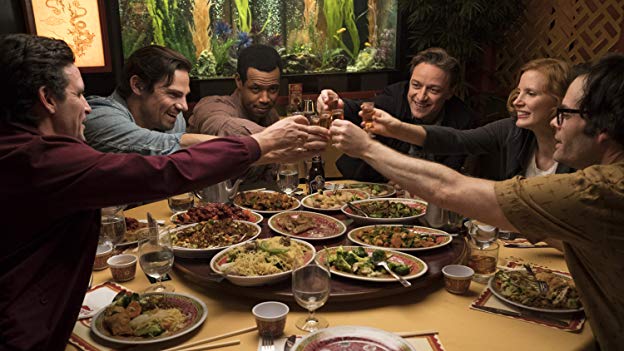Much of that earnestness was derived from Bill Denbrough, played by Jaeden Martell as a boy and James McAvoy as an adult. In a far superior opening scene, Pennywise killed Bill’s younger brother and that loss was felt throughout the rest of It 1. In It 2, Bill is still haunted by his brother’s death and he transfers that guilt onto the children of Derry that Pennywise is now working to pick off. The difference is that those kids only exist as accessories to Bill’s demons and not as victims to be mourned by their never-seen friends and families. These victims, which Pennywise easily consumes compared to the difficulty he seems to have with the adults, register so minimally that I’m still pretty sure that one murder was a taunting hallucination from Pennywise to Bill and not the actual loss of a kid with parents and playmates. Pennywise felt threatening and dangerous in It 1. Here, despite the theoretically richer psychological tapestry that Pennywise could play with, it never feels like any of the adults are at risk.
Bill’s compatriots in attempting to rid this clown plague from the world include childhood crush Beverly (Jessica Chastain), foul-mouthed Richie Tozier (Bill Hader), neurotic Eddie Kaspbrak (James Ransone), slimmed-down Ben (Jay Ryan), and townie Mike (Isaiah Mustafa). With the exception of Mike, everyone’s grown up to be extremely successful, though the world shrinks down to Derry upon their return. There’s little sense that they have lives in the outside world. Mike summons everyone back to Derry to kill Pennywise, causing film-elongating scenes of characters saying no initially and then changing their minds. Like It 1, It 2 also carves out time for each persons’ fears to be grappled with solo, but these are just rehashes of It 1, literally the case for young Richie (Finn Wolfhard) as he had his individual scene cut from It 1 to be held in reserve for the sequel. These connections between the characters’ different versions are writerly, but not writerly enough. Beverly’s with an abusive husband after escaping from an abusive father, and Eddie married an overweight, nagging harridan like his mother. The most transparent link is made and the film goes no deeper. It 2 is uninterested in creating complex characters, and instead makes the viewer sit through a version of itself that pretends to be, adding as much as an hour to an overlong slog.
Even what should be It 2’s bread and butter doesn’t work as well as it did in the original. It 1 had some genuinely startling edits and moments that added up to more than cheap jump cuts. The scares here are all anticipatory, wherein Muschietti introduces a lot of negative space in the frame that will soon be filled up by something or other. Any sense of dread or fear is immediately spent when something pops out in that space, and that’s when Muschietti isn’t sabotaging his own film for jokes that make no sense. There’s a needle-drop in It 2 that’s as baffling and hacky as anything in recent memory. Again, this is a film that opens with a face-kicking, nose-breaking hate crime, and contains a gag worthy of Naked Gun, except that creative team would know better and cut it from the movie. This all culminates in a boss battle immediately recognizable to anyone who’s played video games in the 21st century, complete with stages and mutations that occur when the bad guy is reduced to 50% health.
It 2 is markedly worse than its predecessor in every way. Even the addition of consummate pros like Chastain, McAvoy, and Hader doesn’t elevate the film. They’re going through the motions like Muschietti and Dauberman seem to be. Maybe the secret sauce was Cary Fukunaga, who retained a writing credit on It 1 after being fired as director. He’s nowhere to be seen on the credits of It 2, and that loss perhaps turned this into a lifeless cash grab that it didn’t have to be. D+

 RSS Feed
RSS Feed